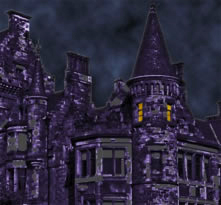Setting
In How to Read Literature Like a Professor, author Thomas Foster says that “in a sense, every story or poem is a vacation, and every writer has to ask, every time, where is this one taking place?” He emphasizes the importance of setting when he remarks, “What . . . does geography mean to a work of literature? Would everything be too much?” Consider the opening sentences of Edgar Allan Poe’s short story “The Fall of the House of Usher.”

Source: House of Usher, IPSI,
DURING THE WHOLE of a dull, dark, and soundless day in the autumn of the year, when the clouds hung oppressively low in the heavens, I had been passing alone, on horseback, through a singularly dreary tract of country; and at length found myself, as the shades of the evening drew on, within view of the melancholy House of Usher. I know not how it was—but, with the first glimpse of the building, a sense of insufferable gloom pervaded my spirit. I say insufferable; for the feeling was unrelieved by any of that half-pleasurable, because poetic, sentiment, with which the mind usually receives even the sternest natural images of the desolate or terrible. I looked upon the scene before me—upon the mere house, and the simple landscape features of the domain—upon the bleak walls—upon the vacant eye-like windows—upon a few rank sedges—and upon a few white trunks of decayed trees—with an utter depression of soul . . .
It should come as no surprise to us that these are the first lines of the story when you recall the definition of exposition. Poe has established the setting. The time of day is dusk; the season is autumn (associated with aging, withering, beginning to die as leaves drop from the trees), and the sky is overcast (“clouds hung oppressively low”). The place is “dreary” country through which the narrator is riding alone on horseback. The detail of travel by horseback provides a hint to the historical time period. The rider approaches the “melancholy” House of Usher which brings on a feeling of “gloom.” The walls of the house are “bleak”; the windows resemble “vacant” eyes; and the trees are “decayed.”
The narrator (who might be the main character or a minor participant in the story) has been introduced through his own thoughts when he describes his psychological state as “unrelieved by any . . . half-pleasurable . . . sentiment.” As readers, we are at this point asking ourselves why the narrator feels an “utter depression of the soul.” We wonder why he has come to the House of Usher and what conflict awaits him there.
The introductory paragraph also sets the mood for the story. Poe’s dreary images of the weather and the narrator’s surroundings definitely evoke a gloomy and dark mood.

Source: Eudora Welty, The Writer’s Workshop
of Asheville NC,
Short story writer Eudora Welty claimed that “fiction depends for its life on place.” She noted that “every story would be another story . . . if it took up its characters and plot and happened somewhere else.” Like the arrangement of events in the plot, setting is a deliberate choice on the part of the author.
Ideas for Reading and Analyzing the Setting of a Story
Kelley Griffith, author of Writing Essays about Literature, says that posing these questions helps to analyze setting:
- “What does it look like, sound like, feel like?”
- “How long does it take for the action to occur? What clues does the author give to indicate how much time is passing?”
- “What is the social environment portrayed in the work—the manners, mores, customs, rituals, codes of conduct of a society? What does the author seem to think about them? (Approving? Ambivalent? Disapproving?)”
Answering these questions can lead you toward the theme of the work.